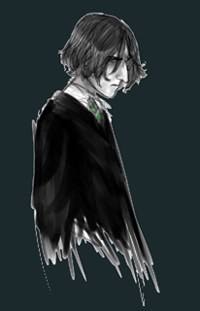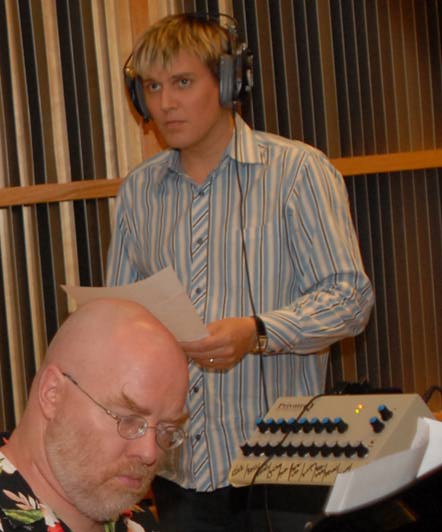WARNING: HARRY POTTER PLOT SPOILERS. BOOK 6 READERS ONLY!
I've had several friends comment that they believe Snape is fundamentally good, and that his apparent badness is some kind of cover. In fact, I've long held out for that possibility. Consider the following scenario:
Dumbledore has destroyed one Horcrux, at the cost of his health and his shrivelled hand. He knows he's on his way out. (If for no other reason, the Wise Bearded Mentor can't last all the way to the end — the hero has to go it alone. That's a rule.)
Dumbledore hears of Voldemort's plan to kill him through Malfoy (really, a way for V to get revenge on Lucius, if you ask me). So, he calls Severus in. This is all still before the action of book 6 starts. He tells Severus all this, and asks him to be the one to kill him. After all, we know now what murder does to you: it [ahem] severs your soul. It splits you somehow, and Dumbledore doesn't want Draco to become a murderer. So, he asks Severus to do the deed, ensuring that a] Draco is spared from becoming a murderer; b] Severus is spared as well, because it's a favor and a necessity and therefore not really a cold-blooded murder; and c] Severus now has an inarguable in with Voldemort and company. By acting this way in the battle, Severus can help win the war.
Hence, when the time comes, Dumbledore's plea — "Severus, please" — isn't a plea for his life, but rather a plea to please do it, carry it through, and save Draco. Narcissa thinks she has made Snape promise to do it to save Draco, but it's only a microscopic "saving": it saves his life from Voldemort (highly unlikely, by the way: no doubt Draco will be in hiding for much of 7, right up till he gets killed). Snape, though, knows he's saving Draco in a macroscopic way: protecting his soul.
Hmmmmm. Very compelling, and yet I think I've come to the conclusion that Snape is bad after all.
It's like when you take an exit from the highway. You're going along parallel, seemingly with the traffic you've just left, but then inevitably the thing curves away, and you might say that at that point you wish you could just go along straight, but you made your decision way back there. Same thing with Snape. He made that unbreakable vow, and there you have it: his decision was made. He was on the Dark side after all, after a lifetime of dancing on the edge.
Sure, we often get scenes of Snape apparently doing wrong, but then really being on the right side after all, even if a bit reluctantly. He despises Sirius, but he's still in the Order with him. But, though Rowling misleads, she never lies. She drops hints all along.
Here's an enormous indication of the type of person Snape is. At the end of book 3, Snape walks into the Shreiking Shack under the Invisibility Cloak, and listens to most of the conversation. He hears everything that Lupin and Sirius and the kids say (right after they notice that the door has opened but don't see anyone come in.) He knows that Sirius is innocent, he knows that Pettigrew is alive, and
yet he's still able to lie about it, present himself as the true do-gooder, the kids as troublemakers who should be expelled, Lupin as an aid to Sirius's crimes, and Sirius himself as a doomed man, whom Severus is glad to deliver to the Dementors to administer their kiss.
What kind of guy is that?
Is this someone who really belongs in the Order of the Phoenix? Time and time again, Snape proves throughout the series that he's simply not other-directed in the way that Rowling consistently shows a decent person must be. His universe revolves around himself. He's still the goth kid who glamorizes his outcastness and his Dark crush. He's still the high-schooler with high-school grudges who can't get past his own nasty view of human nature.
Now the fact is that he's no good for Voldemort either, and my prediction is that he'll be useful to the Order, as he has been, but only inadvertently.
My vote: Snape is bad.







